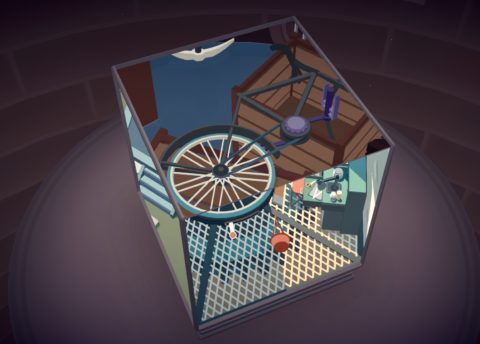Developer: X.D. Network Inc.
Price: $3.99/£3.49
Size: 939 MB
Version: 1.06
Platform: iPhone & iPad
Moncage is a game that does delightful things with perspective. Presented with a glass box that displays different semi-interactive scenes on each of its sides, it’s up to you to prod and swipe the screen to make those disparate components magically join up.
By rotating the box, zooming in on key elements of a scene, and interacting with the mechanisms contained within, you’ll be able to align sections that – on the surface – bear no relation to one another.
For example, you might notice that half a bike wheel joins up with half a mechanical turntable when viewed just so. Adjust the perspective until fuse together, and suddenly the switch that activates the latter will also make the former rotate, unlocking a new aspect of the wider puzzle.
Puzzles within puzzles within puzzles steadily unfurl, like the most elaborate Russian doll. It can be quite beguiling, in way that fans of Monument Valley and Gorogoa will recognise.
That is, when it’s not completely confounding you. Moncage frequently clogs itself up with puzzles that inherently require a large amount of trial and error to work through. What starts as a peaceful, meditative process can too easily turn to frustrated impatience.
There’s a four-stage hint system at play here, which will dole out its knowledge in time-limited, bite-sized chunks. We appreciated the way that this hint system would rarely spell the solution out for you, and that the puzzle would still require some effort on your part to complete.
It’s a good job really, as we found ourselves relying on this tip system a little too much. Perhaps this is a sign of our own impatience, but the best iOS puzzlers will lead you by the hand to their solutions without having to spell them out.
The presentation is top notch, however. While each scene is simply rendered, there’s a real stylized artfulness to them. Hidden photos offer hints at an overarching story throughout, and the atmospheric sound design will entice you to pop on a set of headphones.
You wouldn’t know that the game wasn’t designed exclusively with mobile in mind, with a simultaneous launch on PC. The mechanics really do seem perfectly attuned to touchscreen interaction.
It all amounts to a delightfully layered puzzle box for those who love to sit and pore over a problem, though the impatient and inattentive might want to shift their view elsewhere.





